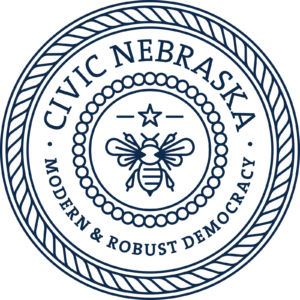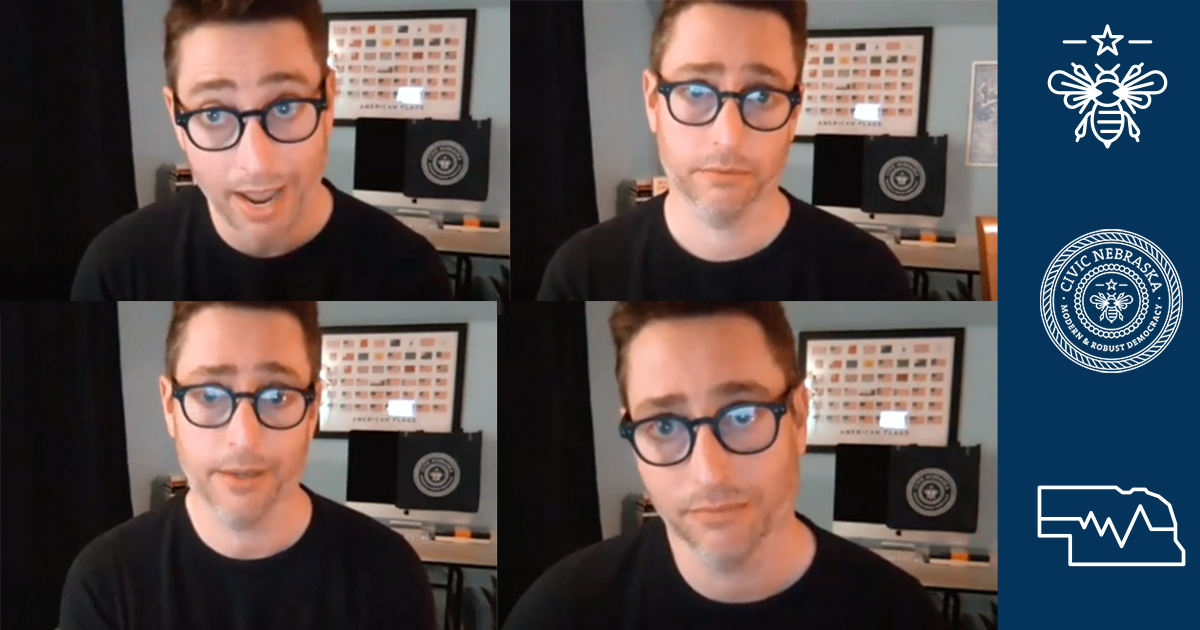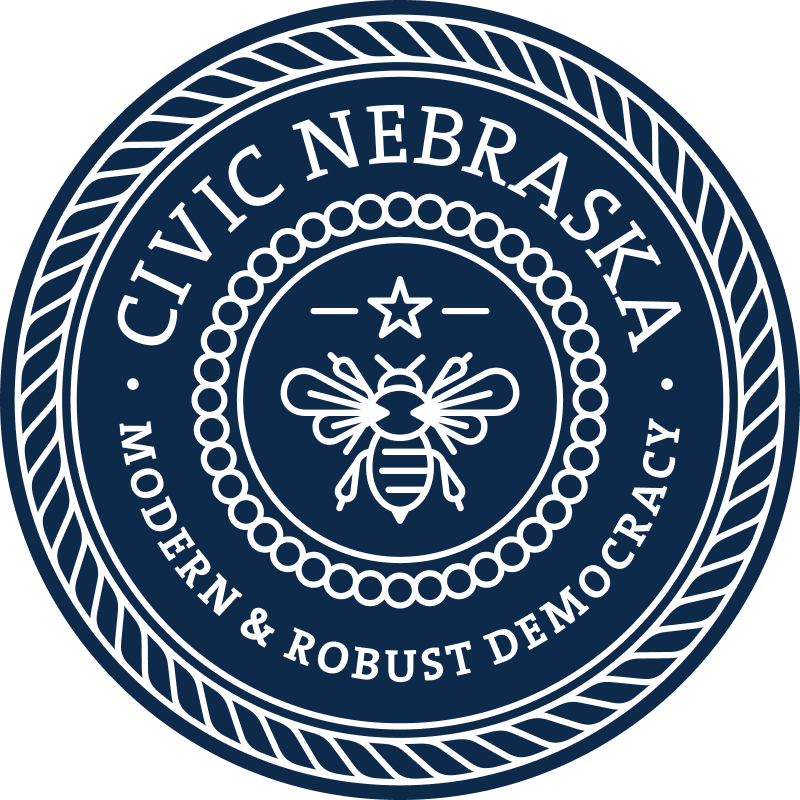On Jan. 23, 2021, Steve Smith delivered the following ‘Civic Sermon’ during Civic Nebraska’s virtual Civic Saturday gathering. Watch the full video of the gathering here, and learn more about Civic Nebraska’s Civic Saturdays at this link.
![]()
Well, friends, here we are. Twenty-three days into a new year, seventy-two and a half hours into a new presidential administration, and two and a half weeks since the attack on the U.S. Capitol … and what felt like an assault on the beating heart of our democracy. I’ll be honest here … I am not certain, given the rollercoaster that we have been through already in 2021, that I am up to the task of bringing much clarity to our gathering today. But I will do my level best.
 When Kathy and I settled on the theme for this Civic Saturday one month ago, we tried to picture what would be on peoples’ minds right now. Maybe a Fool’s Errand. We pictured January Twenty-Three as an opportunity to renew our call for powerful citizenship, for vigilance, and for continued civic activism. Our reasoning went something like this: by the time January Twenty-Three arrived, an increasing number of Americans would probably feel like we would – eager to move on. To get back to a sense of normalcy. We figured folks would be ready to return to a time when their Twitter timelines weren’t full of existential dread, and their iPhone notifications weren’t pushing out emergencies, or spectacles, or moral outrages every other hour. And I gotta tell you, the idea of just … forgetting about the president every once in a while is pretty appetizing.
When Kathy and I settled on the theme for this Civic Saturday one month ago, we tried to picture what would be on peoples’ minds right now. Maybe a Fool’s Errand. We pictured January Twenty-Three as an opportunity to renew our call for powerful citizenship, for vigilance, and for continued civic activism. Our reasoning went something like this: by the time January Twenty-Three arrived, an increasing number of Americans would probably feel like we would – eager to move on. To get back to a sense of normalcy. We figured folks would be ready to return to a time when their Twitter timelines weren’t full of existential dread, and their iPhone notifications weren’t pushing out emergencies, or spectacles, or moral outrages every other hour. And I gotta tell you, the idea of just … forgetting about the president every once in a while is pretty appetizing.
But also, the idea of “normal” still gives me pause. Because if we’ve learned anything over the past year, “normal” ain’t gonna cut it anymore. So I’d planned to take on the notion of “Normal” – a reality built upon decades of our declining participation in civic life – and how it kinda got us to where we are in the first place.
So I’d planned to come up with a sermon about keeping our eye on the ball, and reminding us all that now is NOT the time to let up or let go of that civic energy that many of us reclaimed in the past four years. … That now was NOT the time to go back to filling up our days with ball games, and celebrity gossip, and the latest episode of WandaVision.
Wait, strike that last one – I really like WandaVision.
Anyway, we’ve already gone down that self-indulgent road once, and it ended badly. For years, we assumed that we could just be consumers of democracy, and so I was going to talk – probably for too long – about how that mindset is so at odds with the modern requirements of American citizenship. About how after stepping back from the brink on Election Day, we needed to resolve to never go to sleep on America again.
Sounded like a good plan. And then January Sixth happened.
Frankly, we’re still trying to wrap our heads around what happened that day — from just about every standpoint: Social. Cultural. Political. And increasingly, legal. The questions keep coming: What on Earth were these people thinking? They were chanting WHAT? They believe … WHAT? I’m not gonna add a lot to that today. Such amateur anthropology feels so very Trump-Era, and I think we’re all quite weary of that right now.
So I want to talk today about where we go from here. And, more importantly, how we go from here. True to our original theme, I do want to talk about power: First, the power of truth. Then, the power of faith. And finally, the power of speaking up and standing out.
There’s a lot of talk about truth right now. I will say what others have said before me: Democracy will not survive if the number of Americans who refuse to acknowledge the concept of shared facts – a number that is currently in the minority – becomes the majority. At that point, it’s Game Over. Nothing else works. There will be no realm of public life, no space in which we all compete and cooperate for resources, rights, responsibilities, and ideals. There will be no collective social process to build our society. Abandoning the truth is abandoning democracy. It’s really that simple.
But there is power in facts. And there is power in accepting facts as true – in recognizing the evidence of our eyes and our ears and using our God-given gift of logic to interpret that evidence.
So, for the record, these are the facts that we must accept. On January Sixth, a mob of insurrectionists, whipped into a frenzy by the sitting president, stormed our nation’s legislative chambers and halted the certification of his successor’s electoral win. At the Capitol doors, the mob chanted for the sitting vice president to be hanged. Others called for kidnapping or assassinating our elected leaders. Insurrectionists ransacked and looted Congressional offices, stole and damaged property, and paraded the Stars and Bars through the Capitol halls. That’s something Robert E. Lee never managed to accomplish. Shots were fired. Blood was spilled. A police officer was bludgeoned and later died from his injuries. Another officer was dragged down the Capitol steps and beaten. And, as the world watched, the citadel of the world’s oldest democracy fell into the hands of insurrectionists.
All of these are facts. As the days pass and the picture of January Sixth comes into fuller focus, we can best serve our nation by respecting these facts. They must persist … forever. We cannot let them fall victim to the forces of untruth that led to this treasonous act in the first place. Only through fidelity to the truth – and through defending, repeating, and spreading it – can we climb our way out of this abyss.
Now, here’s the hard part.
It’s not enough to simply say we support facts, to say we support the truth. It is vitally important going forward that we all take ownership of the truth. We all can start by taking responsibility – because we are all interconnected co-creators of our shared democratic reality – for the facts of what happened on January Sixth.
 This is not another call for “unity” and “healing.” I appreciate our new president’s call for unity, and the need to come together to overcome great national challenges. But I also know that over the years, our democracy has endured long periods of disunity, too. Anyone with an understanding of American history knows our nation has never truly been united. Our national success has never depended upon unifying all of us or healing all of our wounds. So let’s just set that trope aside.
This is not another call for “unity” and “healing.” I appreciate our new president’s call for unity, and the need to come together to overcome great national challenges. But I also know that over the years, our democracy has endured long periods of disunity, too. Anyone with an understanding of American history knows our nation has never truly been united. Our national success has never depended upon unifying all of us or healing all of our wounds. So let’s just set that trope aside.
But – and there’s always a but – this is NOT a time for us to continue abdicating our responsibilities as citizens. Of shirking our duties to build and maintain a stronger civil society. To practice democracy. Those things have been declining or have been flat-out absent in America for longer than we’d care to admit. Once, they would have stood as safeguards against these evil forces that stewed and festered, festered and stewed, until they finally crashed through the doors of the Capitol. Given the current state of our civic life, it shouldn’t be surprising how many times we heard the phrase: “Oh, this is not who we are.” But the inescapable fact that the insurrection actually happened means that this is precisely who we are.
That was not a kind thing to say. But the facts of January Sixth are not kind. They are not supposed to make us feel good about ourselves. It’s human nature to want to look away, to distance ourselves, to rationalize how this happened. Don’t. We must accept the facts. And by accepting them, we can find power in them.
Because facts have power. We must respect that power, and we must be partisans for truth. In the short term, facts will serve to hold the rioters accountable. In the long term, they will help rebuild a mutual respect that can protect our democracy from future threats. Only in mutual acceptance of … stubborn … facts will we find the will to move forward. And part of moving forward means we have to look back at January Sixth and say – Never again.
Never. Again.
Now. Saying that is one thing. Ensuring it is something altogether different. We have purposeful work to do. Work that Joe Biden and Kamala Harris can’t do for us. And really, if you’re here today, you know this already. You know that it’s going to be up to us.
And you’ve probably already figured out that it is going to take faith. That’s the second thing I want to talk about today: There is power in faith.
Facts and faith are not mutually exclusive. Nearly everything we do has some faith to it – from planting a garden in the spring to scheduling an outdoor wedding, to wearing red to watch the Huskers even though they’re 14-point underdogs to Michigan. The same is true with democracy. Eric Liu, the father of Civic Saturdays, is fond of saying democracy works only if enough people believe democracy works. I suppose you might wonder if this is the case anymore. I mean, the videos of the insurrection were eye-opening in so many ways. Most of all, they told us this: Those who attacked the Capitol have lost their faith in democracy. Many who weren’t at the Capitol have, too. I’ll go there: If polls are to be believed, a majority of the 74 million people who voted for Donald Trump still believe that the 81 million people who voted for Joe Biden somehow stole the election. By accepting this rigged-election narrative, despite overwhelming evidence to the contrary, they have put the lies of one man above their faith in America.
Can they be brought back? Can they be restored? Well, I do certainly hope so. And I pray for it. But I do this knowing that ultimately, it’s their choice and their choice alone. But what we can do amid their struggle is to keep the faith. And we can spread the faith. Faith in our systems, in our institutions, in one another. And maybe, just maybe, we can make the path for our fellow-citizens’ safe return a little easier.
We do this knowing that, yes, QAnon is contagious. But so is democracy. In fact, if I were betting on it, I’d bet the house on democracy. Throughout our history, it has been the dominant contagion. It might not feel like it at this precise moment, but it’s got an excellent long-term track record.
 History suggests that the disillusioned and the disaffected do not readily participate in a system that they believe has failed them. Yet, we’ve evidence to the contrary time and again in America. The record number of voters in November reminds us that faith in democracy is an old and powerful American trait. It has driven us relentlessly forward, ever since overtaxed British subjects first considered what a free, independent America might look like. This faith is woven through our American story, from enslaved peoples breaking free, to exploited workers banding together and finding strength in numbers, to women reaching for the ballot at long last. This faith helped extinguish Jim Crow, lift millions out of poverty, end unjust wars, and inspire millions more to claim their American rights. From Philadelphia to Seneca Falls to Selma to Stonewall, faith grew into ideas, ideas grew into connections, and connections grew into powerful and historic movements.
History suggests that the disillusioned and the disaffected do not readily participate in a system that they believe has failed them. Yet, we’ve evidence to the contrary time and again in America. The record number of voters in November reminds us that faith in democracy is an old and powerful American trait. It has driven us relentlessly forward, ever since overtaxed British subjects first considered what a free, independent America might look like. This faith is woven through our American story, from enslaved peoples breaking free, to exploited workers banding together and finding strength in numbers, to women reaching for the ballot at long last. This faith helped extinguish Jim Crow, lift millions out of poverty, end unjust wars, and inspire millions more to claim their American rights. From Philadelphia to Seneca Falls to Selma to Stonewall, faith grew into ideas, ideas grew into connections, and connections grew into powerful and historic movements.
The rest is quite literally history.
Now, I’m not saying you can just wish a better world into being. But even amid the fresh horrors at the Capitol, I know in my heart of hearts that we Americans are up to the challenge. We always have been. Our country has never advanced neatly, in an orderly or even peaceful fashion. Our history is full of people rushing forward to claim their rightful power, hitting walls of opposition, and then finding ways around those walls. Along the way, Americans have stretched the imaginations and the intent of our Founders – those wild-eyed dreamers of their day – by expanding the blessings of liberty to those of every race, gender, background, and creed.
History calls on us, at this moment, to summon our faith once more.
Democracy is contagious. It has worked because enough people have believed it works. As we move through these difficult days, it is tempting to dwell on predictions of doom. But, to paraphrase John Lewis, the work is not the struggle of a day, a week, a month, or a year, but of a lifetime. And with faith, we will overcome.
Finally, there is power in standing out and speaking up.
There’s a theory known as the “Spiral of Silence.” It goes something like this: Humans dread isolation and rejection, and so often, we stay quiet instead of speaking up when we have the chance. We’re afraid we’ll be seen as being out of line with the dominant opinion. We can usually sense what the prevailing opinion is and simply withdraw for the sake of self-preservation. This “spiral” was first employed to explain why the good people of Germany in the 1930s didn’t speak out against the rise of the Nazis and their atrocities.
The “spiral” is created – and the silence compounded – when those in the self-professed majority confidently voice what they assume is the dominant opinion. Those who sense their views are in the minority fear being shunned, and they stay silent, and the majority opinion hardens. And the spiral continues. The hesitation, the silence, and the fear; the hesitation, the silence, and the fear. On and on it goes.
This is a tough nut to crack, especially if you feel legitimately outnumbered. And, while the status quo has certainly shifted in times of upheaval – such as the protest-filled summer of 2020 – the dominant opinion is dominant for a reason. It’s formidable and self-justifying. Not to mention that our social customs tend to reward civility. As Midwesterners, we know this. We know all about Midwestern Charm and Nebraska Nice. We reward politeness and comfort. We discourage aggression.
Still, nowhere do we give the loudest or the most confident an absolute right to impose their worldview on the rest of us. Just as our founding document protects against absolute majoritarian rule, it empowers us – hell, it begs us – to not just go along with the crowd. It implores us to be individuals, to advocate for our beliefs, to summon the power of speaking up and standing out, and to inspire others to do the same. Our founding creed gives us the ability to participate with purpose – out in the open – to provide others an example of how to join in.
Speaking up and standing out makes conventional wisdom crumble. Many times, it really does turn out that it was based on untruths, or that it only existed because its supporters were louder and more aggressive than everyone else.
In so many ways, this citizen power is needed right now as we work to beat back the anti-democratic lies that have infected so many of our friends, family, and loved ones. Speak up and stand out. Be an example for your circles.
I can almost hear the rumblings on the other side of my screen. “I’ve tried, Steve. All it’s done is made my family mad at me. Standing out and speaking up sounds nice, but I gotta live in this town.”
 Well, perhaps the early returns are not what you’d hoped. But this doesn’t mean we should just give up and surrender to the spiral. Change often comes slowly. This can be a marathon, not a sprint. But honesty and persistence – whether it be over the dinner table or in a Facebook thread – leads to trust, which leads to connection, which leads to empathy, which leads to compromise and even change.
Well, perhaps the early returns are not what you’d hoped. But this doesn’t mean we should just give up and surrender to the spiral. Change often comes slowly. This can be a marathon, not a sprint. But honesty and persistence – whether it be over the dinner table or in a Facebook thread – leads to trust, which leads to connection, which leads to empathy, which leads to compromise and even change.
But it starts by claiming our power to stand up and speak out.
Change – progressive change – has been the story of America. And so it must continue to be. In this extraordinary time, rising from the betrayal of insurrection, we have an opportunity – we have a duty – to remake America, again. Let’s harness the sustaining power of truth, the rejuvenating power of faith, and the energizing power of standing out for the struggle ahead. In 2021, the goal is not to get back to “normal,” whatever that was. The fight is for democracy – a universal, expansive, representative democracy, not the narrow, exclusionary system the rioters sought to impose. So here in the onset of this new era, it’s time to claim our inherent power as citizens.
Let’s ask those age-old questions that have moved mountains throughout our American story: How can things be different? How can things be better? How can WE be better? And then, when we find the answers, let’s go make it reality.
Thank you.



